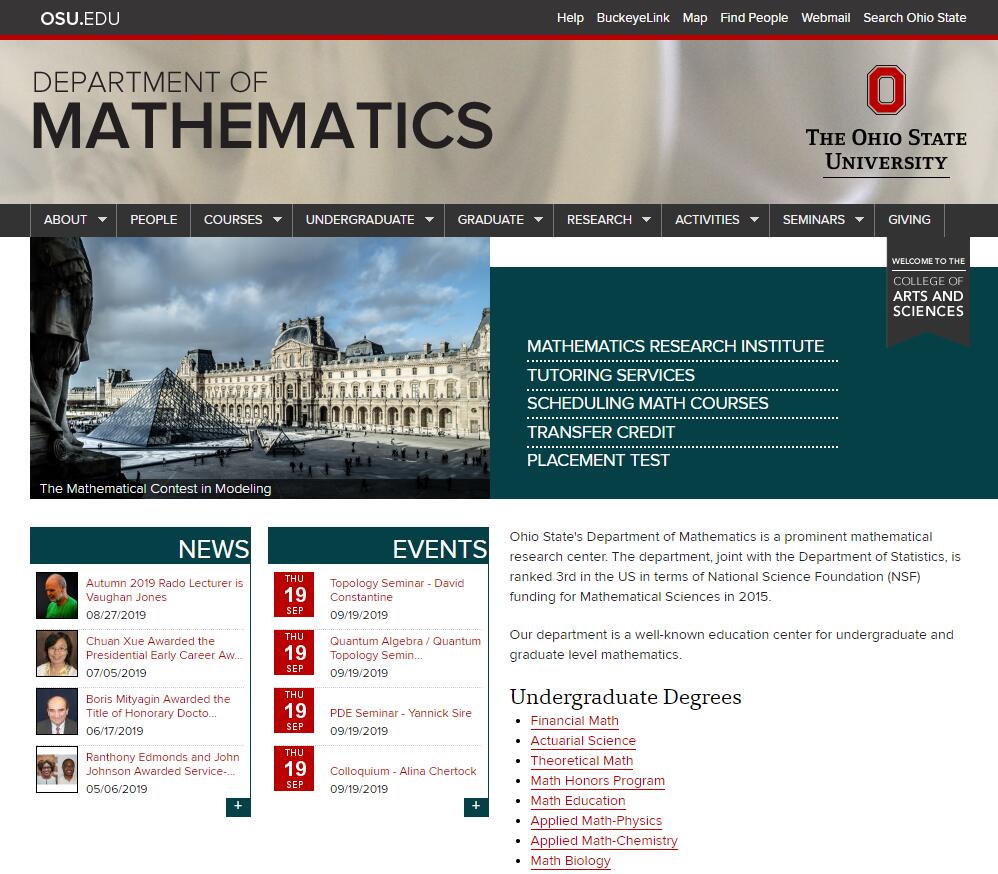Offers latest ranking of top schools for mathematics in Ohio. You can learn what the top-ranked math colleges and universities are in Ohio, and compare the best math colleges on TopSchoolsintheUSA.com. Search the top graduate schools in math, view school profiles, and contact information for all 8 mathematics colleges in Ohio.

| School Rank | Graduate Mathematics |
| 1 | Ohio State University–Columbus Department of Mathematics Address: 231 West 18th Avenue, Columbus, OH 43210-1174 Admissions Phone: (614) 292-6274 Admissions E-mail: dwitcher@math.ohio-state.edu Admissions Website: http://www.math.ohio-state.edu |
| 2 | Case Western Reserve University Department of Mathematics Address: 10900 Euclid Avenue , Cleveland, OH 44106-7058 Admissions Phone: (216) 368-2880 Admissions E-mail: gxl34@cwru.edu Admissions Website: http://www.case.edu |
| 3 | Kent State University Department of Mathematical Sciences Address: Summit Street , Kent, OH 44242 Admissions Phone: (330) 672-2430 Admissions E-mail: math-gradinfo@math.kent.edu Admissions Website: http://www.kent.edu |
| 4 | University of Cincinnati Department of Mathematical Sciences Address: PO Box 210025, Cincinnati, OH 45221-0025 Admissions Phone: (513) 556-4050 Admissions E-mail: gpc@math.uc.edu Admissions Website: http://math.uc.edu |
| 5 | Ohio University Department of Mathematics Address: 321 Morton Hall, Athens, OH 45701 Admissions Phone: (740) 593-1254 Admissions E-mail: mjm@math.ohiou.edu Admissions Website: http://www.math.ohiou.edu |
| 6 | Air Force Institute of Technology Graduate School of Engineering and Management Address: 2950 Hobson Way, Wright Patterson AFB, OH 45433-7765 Admissions Phone: (937) 255-3636 Admissions E-mail: alan.lair@afit.edu Admissions Website: http://www.afit.edu |
| 7 | Bowling Green State University Department of Mathematics and Statistics Admissions Phone: (419) 372-2637 Admissions E-mail: msproul@bgsu.edu Admissions Website: http://www.bgsu.edu |
| 8 | University of Toledo Department of Mathematics Address: 2801 W. Bancroft Street, Toledo, OH 43606-3390 Admissions Phone: (419) 530-2568 Admissions E-mail: dawhite@math.utoledo.edu Admissions Website: http://www.math.utoledo.edu |
Ohio State Overview
The state of Ohio got its name from the Ohio River, the deepest tributary of the great Mississippi River. In turn, the name of the Ohio River comes from the word ohi-yo, which in the language of the Seneca Indians means “good river” or “big river”
In the second half of the 17th century, the territory of the modern state of Ohio formally became part of the New France colony. In 1669, the famous French explorer René de La Salle explored northeast Ohio. The French actively developed trade with the Indians (mostly buying furs), built several trading posts and forts in Ohio. In the first half of the 18th century, English colonists living on the east coast also showed increasing interest in Ohio, which led to conflicts between the British and the French, as well as the Indians who supported them.
After the end of the French and Indian War in 1763, the Ohio lands came under the control of Great Britain, although many Indian peoples continued to oppose the British.
After the United States of America gained independence in 1787, the Northwest Territory was created, which included most of the modern Midwest of the United States (including Ohio). In 1788, the first American settlement in Ohio was founded – the city of Marietta. Armed clashes with the Indians continued, and only in 1795 was an agreement signed under which the Indian peoples transferred the lands of Ohio to the US government.
Ohio’s population grew and in 1803, the third President of the United States, Thomas Jefferson, signed a law that approved the Ohio Constitution and its boundaries. In fact, Ohio became the seventeenth state of the United States, although the US Congress did not pass the corresponding law. Formally, this incident was corrected only in 1953, and the date of the formation of the state of Ohio was announced on March 1, 1803.
About 900,000 people now live in Ohio’s capital and largest city, Columbus. The largest urban agglomeration in the state has grown in the south, around the city of Cincinnati (about 2,220,000 residents).
Ohio has a very well developed and diversified economy, with industry and finance as its largest sectors. In Ohio, metallurgy, mechanical engineering, chemical, aerospace, food and other industrial sectors are well developed. Ohio’s primary crops are tomatoes (one of the state’s symbols), corn, and soybeans; the state’s farms raise cattle, pigs, and sheep.
